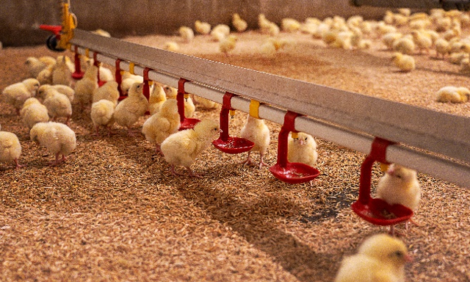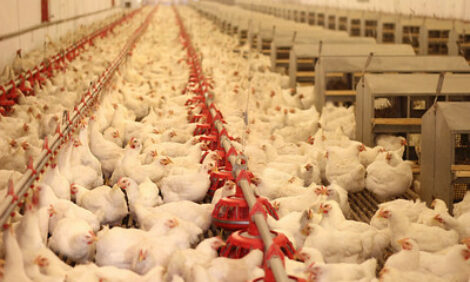



4 questions to ask when picking up new chicks
4 questions to ask when picking up new chicks
Pair excitement with education when starting a new flock journey.
Shoreview, Minn. [April 25, 2016] – You’ve researched your city rules and set-up your brooder. Now it’s time for the fun part: picking up new chicks! When visiting a feed store or ordering chicks from a breeder or hatchery, it’s important to also pick-up the correct corresponding information.
That’s according to Gordon Ballam, Ph.D., a flock nutritionist for Purina Animal Nutrition. Ballam recommends asking four primary questions when picking up new chicks: Is this the correct breed for me? What is the gender? Are the chicks vaccinated? And how can I start planning now for laying season?
Read on to learn which answers to listen for.
1. Is this the right breed for me?
“Chickens are surprisingly easy to take care of,” Ballam says. “Chicken raising is the most fun when you have a breed best suited for your goals and climate.”
- Goals: For fresh eggs, consider: White Leghorn hybrids (white eggs), Plymouth Barred Rocks (brown eggs), Rhode Island Reds (brown eggs), Blue Andalusians (white eggs) or Ameraucanas/Easter Eggers (blue eggs). Cornish Cross chickens grow quickly and are best suited for meat production. If you’re hoping to produce both eggs and meat, consider dual-purpose breeds like Barred Rock, Sussex or Buff Orpingtons.
- Climate: Select a breed that will do well in your environment. Heat-tolerant breeds are typically smaller with lighter feathering and bigger combs and wattles to help with heat dissipation. Heat-tolerant breeds for beginners include Leghorn, Minorca, Rhode Island Red, Turken and Ameraucana.
On the other hand, cold-tolerant breeds are typically larger in body size with heavier feathering for natural warmth. If you live in an area with frigid winters, consider breeds such as Araucana, Australorp, Barred Rock, Minorca, Orpington or Wyandotte breeds.
“For the most part, suppliers are going to keep birds that are easy to manage, like Buff Orpingtons, Barred Rocks and Ameraucanas,” Ballam says. “When you get more experienced, start looking into breeds that are a little more exotic or possibly require more management.”
2. Are the chicks males or females?
It is often difficult to tell the gender of baby chicks. Because it takes a trained eye for sex determination, Ballam recommends asking the supplier for the gender and then using that information to pick your new pets.
“A trained professional can use vent- or feather-sexing depending on breed,” he explains. “Unless the breed shows gender phenotypically, it takes lengthy training to sex a chick correctly. Be sure to tell your supplier if you’d like pullets or cockerels.”
This information is especially useful for those living in areas with restrictions. Ballam stresses having a plan in place for roosters in case you accidentally pick up a rooster.
“The truest way to determine gender is to watch the chick grow,” he says. “In the teenage phase, males will become larger with more pronounced combs and wattles and longer tail feathers. While it takes more time, observation is the most practical and accurate way to determine the sex of a chick.”
Crowing can also help determine gender. Most roosters begin to crow as they approach sexual maturity which can range from 3-5 months after hatching, depending on the breed.
3. Are the chicks vaccinated?
Next, confirm if chicks were vaccinated. Many hatcheries vaccinate chicks before shipment.
“To prevent potential disease problems, make sure chicks are from a credible U.S. Pullorum-Typhoid Clean hatchery or trusted breeder,” Ballam says. “Ensure the hatchery vaccinated chicks for both coccidiosis and Marek’s Disease, a Herpes virus found in poultry.”
If chicks have been vaccinated against coccidiosis, a non-medicated complete feed should be provided. Select a complete feed that includes enhanced amino acids to promote early chick development, prebiotics and probiotics to support immune health and a balance of vitamins and minerals to support bone health and bird growth.
“If chicks were not vaccinated, protect them with a medicated feed,” Ballam explains. “Medicated complete feeds, like the medicated option of Purina® Start & Grow® Premium Poultry Feed, includes amprolium. Amprolium is a coccidiostat formulated to help the young chick to develop an immunity to coccidiosis (an internal parasite) as they grow into adulthood.”
4. When will these chicks start laying eggs?
The age when hens start laying eggs varies by breed, often around 18-20 weeks of age. Ask the supplier when your selected breed will begin laying. Then, create a plan for transitioning to a layer feed before the first egg arrives.
“A bird’s best friend is consistency, so we recommend having a plan in place for layer season from day one,” says Ballam. “When picking up new chicks, ask for recommendations on both starter and layer feeds. Pick a feed that includes Oyster Strong™ System for strong shells and omega-3 for added egg nutrition. For consistency, offer the same feed brand from start to lay.”
To find baby chicks near you and to learn more about starting a flock, attend a local Purina® Chick Days. Find a local event at www.PurinaChickDays.com or by connecting with Purina Poultry on Facebook or Pinterest.
Purina Animal Nutrition LLC (www.purinamills.com) is a national organization serving producers, animal owners and their families through more than 4,700 local cooperatives, independent dealers and other large retailers throughout the United States. Driven by an uncompromising commitment to animal excellence, Purina Animal Nutrition is an industry-leading innovator offering a valued portfolio of complete feeds, supplements, premixes, ingredients and specialty technologies for the livestock and lifestyle animal markets. Headquartered in Shoreview, Minn., Purina Animal Nutrition LLC is a wholly owned subsidiary of Land O’Lakes, Inc.
###
Editor’s Note: Images available for download at: http://bit.ly/1VggJMx.
Cutlines:
Purina_Gordon Ballam: Gordon Ballam, Ph.D., a flock nutritionist for Purina Animal Nutrition, recommends asking four important questions when picking up new chicks: breed, gender, vaccination status and length to egg laying.
Purina_Brooder: Many Purina® retail locations have chicks in store during Purina® Chick Days events. During the events, customers can pick out new chicks and learn steps for starting a new fun, family project.
Purina_Chicks: When selecting new chicks, be sure to ask the right questions from day one. Included in the list should be a discussion on layer feed options, so you can have a plan in place for long-term consistent nutrition.








